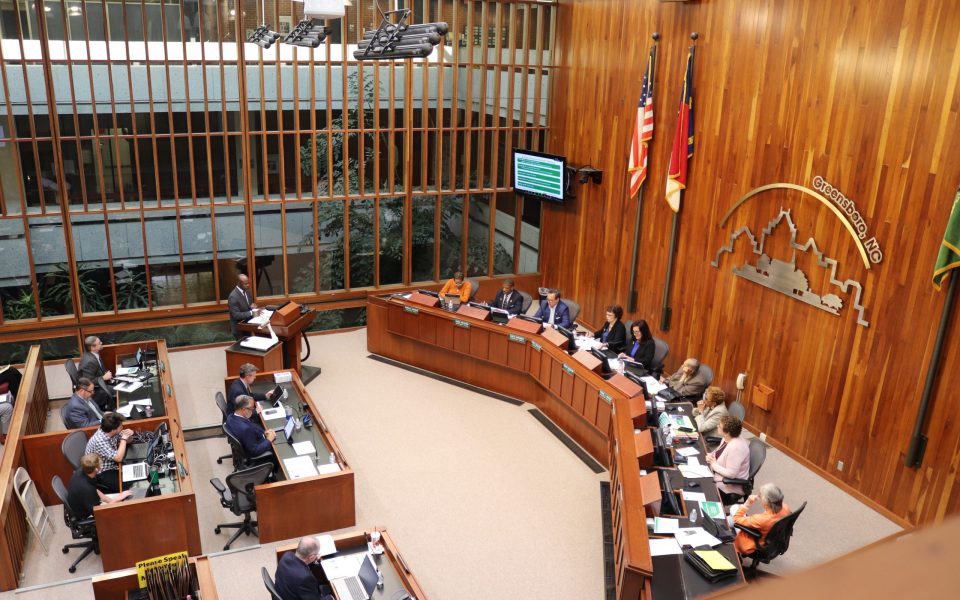The cities of Greensboro and Winston-Salem have released their yearly budgets. In the coming weeks, opportunities for the public to voice their opinions on them will be available.
Winston-Salem’s budget presentation will occur on May 30 at 4 p.m.
Winston-Salem’s Finance Committee will hold workshops on the budget on June 1 and June 8 at 4 p.m. while Greensboro city councilmembers have already attended work sessions to discuss the budget on May 23 and May 25.
Winston-Salem’s Finance Committee — comprised of councilmembers Robert Clark, Mayor Pro Tempore Denise D. Adams, Jeff MacIntosh and James Taylor, Jr. — will hold a public hearing on June 1 at 6 p.m. The full city council is scheduled to hold a public hearing and vote on the budget on June 20 at 6 p.m. All meetings are open to the public and will be held in the council chambers on the second floor of City Hall at 101 N Main St.
The public may comment on Greensboro’s budget via email and during the city council budget public hearing on June 6 at 5:30 p.m. in the council chambers of Melvin Municipal Office Building at 300 W. Washington St. There’s also a budget simulator on the city’s website where you can make suggestions on the budget. Comments on Winston-Salem’s budget can be submitted here.
Winston-Salem’s total operating budget is $605.7 million, decreasing 3.5% from the previous year. Greensboro’s is $749.5 million — an 8.8% increase.
Both budgets go into effect on July 1.
What’s in the budgets?
Police salaries have been a hot topic during Greensboro city council meetings. At-large councilmember Marikay Abuzuaiter has often advocated for higher police salaries, while other councilmembers like District 1’s Sharon Hightower have said, “If we fund all the police to the tune that some wanted to, we’re gonna have to take away something. And who’s gonna be impacted the greatest? That is the community that is saying, ‘Invest in us too.’”
Right now new police salaries for Greensboro’s recommended budget sit at $52,459, while the new minimum salary for police officers in Winston-Salem will be $52,500.
In order to fund an increase in police pay, 30 vacant GPD patrol positions would be decreased while WSPD would eliminate 50 unfilled police officer positions.
GPD will also convert 10 sworn positions to professional positions. GPD Chief John Thompson told the council during the May 23 work session, “They’re positions that sworn officers sit in that will now be professional staff positions,” Thompson said that this will transfer work away from sworn officers and bring them out of professional staff positions like court liaisons.
“We are looking at ways of putting police where police need to be, answering the calls that they need to answer, and making sure that we’re staffing those resources appropriately,” Thompson said.
Wages for city workers in both cities are also set to increase.
Greensboro would raise the minimum wage for city workers from $15.91 per hour to $17, while Winston-Salem’s minimum wage would increase to $15.45. In Greensboro, tensions came to a head in April when dozens of city workers gathered in the council chambers to request higher wages during the public comment period. During City Manager Taiwo Jaiyeoba’s report to the council on May 16, Hightower told Jaiyeoba that she supported no less than $18 and is seeking $20.
Get involved:
Greensboro
Public Hearing
- When: June 6 at 5:30 p.m.
- Where: Melvin Municipal Office Building at 300 W. Washington St.
Winston-Salem
Workshops
- When: June 1 and June 8 at 4 p.m.
- Where: City Hall at 101 N Main St.
Public Hearings
- When: June 1 and June 20 at 6 p.m.
- Where: City Hall at 101 N Main St.
All CityBeat reporting content is made possible by a grant from the NC Local News Lab Fund, available to republish for free by any news outlet who cares to use it. Learn More ↗
Republish this storyJoin the First Amendment Society, a membership that goes directly to funding TCB‘s newsroom.
We believe that reporting can save the world.
The TCB First Amendment Society recognizes the vital role of a free, unfettered press with a bundling of local experiences designed to build community, and unique engagements with our newsroom that will help you understand, and shape, local journalism’s critical role in uplifting the people in our cities.
All revenue goes directly into the newsroom as reporters’ salaries and freelance commissions.


Leave a Reply